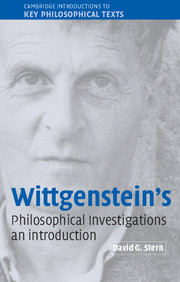Book contents
- Frontmatter
- Contents
- Acknowledgements
- Note on the text
- Introduction
- Chapter 1 Philosophical Investigations §§1–693: an elementary exposition
- Chapter 2 From the Tractatus to the Investigations: two prefaces
- Chapter 3 The opening of the Philosophical Investigations: the motto
- Chapter 4 The critique of referential theories of meaning and the paradox of ostension: §§1–64
- Chapter 5 The critique of rule-based theories of meaning and the paradox of explanation: §§65–133
- Chapter 6 The critique of rule-based theories of meaning and the paradoxes of rule-following: §§134–242
- Chapter 7 The critique of a private language and the paradox of private ostension: §§243–68
- Conclusion
- Recommended further reading
- References
- Index
Chapter 7 - The critique of a private language and the paradox of private ostension: §§243–68
Published online by Cambridge University Press: 05 June 2012
- Frontmatter
- Contents
- Acknowledgements
- Note on the text
- Introduction
- Chapter 1 Philosophical Investigations §§1–693: an elementary exposition
- Chapter 2 From the Tractatus to the Investigations: two prefaces
- Chapter 3 The opening of the Philosophical Investigations: the motto
- Chapter 4 The critique of referential theories of meaning and the paradox of ostension: §§1–64
- Chapter 5 The critique of rule-based theories of meaning and the paradox of explanation: §§65–133
- Chapter 6 The critique of rule-based theories of meaning and the paradoxes of rule-following: §§134–242
- Chapter 7 The critique of a private language and the paradox of private ostension: §§243–68
- Conclusion
- Recommended further reading
- References
- Index
Summary
ON THE VERY IDEA OF A PRIVATE LANGUAGE: §§243–55
Sections 243–55 introduce the idea of a private language; §§256–315 contain an extended attack on the very idea of a private language, interwoven with a host of related issues. In the opening remarks, Wittgenstein's narrator attends not only to the question of the kind of privacy that is under discussion, but also to the more general issue of the relationship of first-and third-person statements about sensation.
This part of the text has struck many interpreters as a place where Wittgenstein is at his most un-Pyrrhonian. For he appears to proceed in a highly dogmatic fashion. Three examples stand out in the opening remarks of this chapter of the Philosophical Investigations. He is widely taken to be maintaining the following controversial philosophical views. (1) In §244, he appears to summarize his ‘expressive theory of meaning’ for first-person psychological discourse. On the ‘expressive theory’ of pain, first-person talk about one's current pain is not a report on an inner state, but rather has the role of a learned replacement for instinctive pain-behaviour – in other words, saying ‘I am in pain’ is to be construed as akin to saying ‘Ouch!’, which in turn takes the place of the cries of a child that has not yet learned to speak. (2) In §246, he maintains that it is a grammatical error to say ‘I know I am in pain’ rather than ‘I am in pain.’
- Type
- Chapter
- Information
- Wittgenstein's Philosophical InvestigationsAn Introduction, pp. 171 - 185Publisher: Cambridge University PressPrint publication year: 2004

